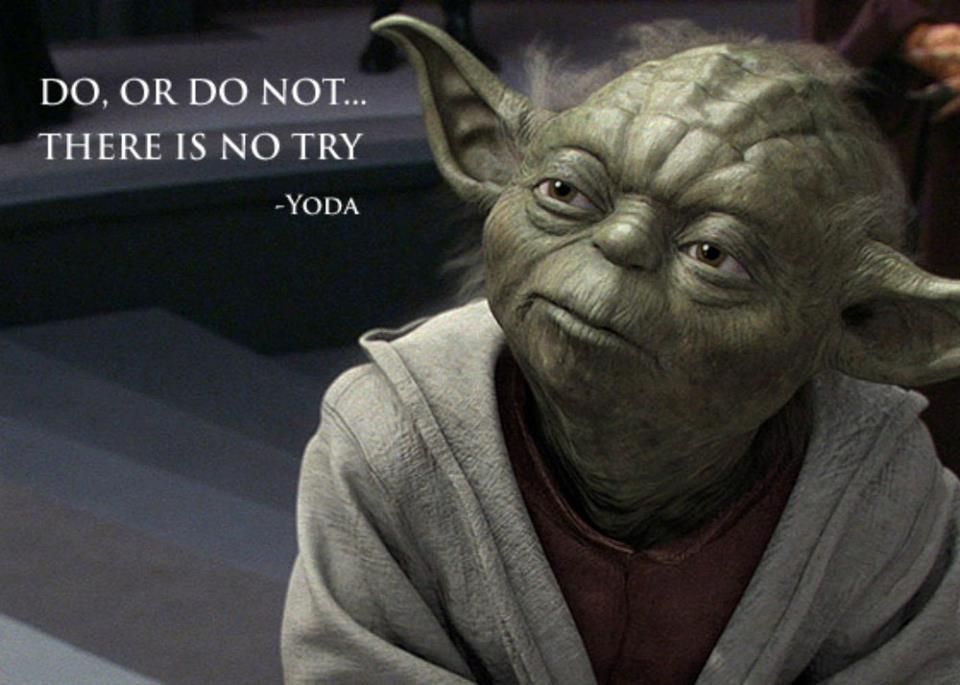Don't "Try" To Do Anything

“I’ll try to be home by 6:00.”
“I’ll try to have this project done by end of next week.”
“I’m trying to stop smoking.”
What do all these “try” statements have in common?
Before I give you my take, let me tell you why I’m thinking about “I’ll try” right now.
A man recently told me he was going to “try” to make a group meeting. He was leaving town, and noted he had a lot to do while away, and that he would return either on the day of the meeting or the day after. He hadn’t reserved his flight home yet — keeping his options open — and said if he could get away on the morning of the meeting, he would “try to get there.”
I thought to myself, Why doesn’t he just say he’s not coming?
If I had all that on my plate and bothered to share all that uncertainty with someone, I am basically saying I won’t be there. Don’t count on me, because I’m not counting on me, either.
But if that’s the case, why tack on, “I’ll try to get there” after giving so many reasons why it probably won’t happen?
I thought about why I say ”I’ll try” in such circumstances. I know that people will not like it if I give an outright “No” to their request. Because I hate disappointing people, I add “I’ll try” as a way to soften the blow. It also helps me feel better about myself. I hold up my good intentions and tell myself, See? I’m really not such a bad guy! At least I tried to do it!
So what all these “try” statements have in common is this: To the person listening, they communicate nothing.
I’m offering no reliable information. There’s nothing depend on; nothing certain about my future behavior. It’s a useless, empty phrase that I’m only saying to help me feel better.
Think about it: If you work in construction and a supplier tells you they will “try” to deliver crucial materials to the job site on a certain day, would you go ahead and hire sub-contractors to do work dependent on those supplies? You cannot make any definitive plans because the materials may or may not get there. You are better off ignoring the supplier’s “promise” and use your workers elsewhere.
Or if you tell your wife you’ll “try” to stop drinking so much, what is she supposed to do with that? Jump up and down with joy? You’ve told her nothing — nothing — about what she can count on from you. At the next social gathering where alcohol is being served, she best bring her set of car keys, because she may well have to drive you both home. You saying you’ll “try” not to over-indulge may make you feel better, but it will do nothing either to predict your actual behavior or increase your wife’s trust in you.
As men and women who are committed to honoring our word in matters large and small — “impeccable with our agreements” — we would do well to eliminate the phrase “I’ll try…” from anything we say to others.
If you decide to take on this challenge, I must warn you: It will annoy you to no end to hear how often it gets thrown around, and it will take you into scary territory where you will have to say a lot more “no’s” to people because you realize that’s really what’s behind your saying you’ll try.
But the payoff could be huge. People will trust you more, because your yes means yes, and your no means no. They might not like you saying no, but that dislike will be far less than the dislike coming from you saying ”maybe” and leaving them hanging. You will have a cleaner conscience and spend a lot less time and energy vacillating.
Yoda may only be a fictional Star Wars character, but he was speaking rock-solid truth when he told Luke Skywalker, “Do, or do not. There is no try.”
So let’s all get out there and try to eliminate trying! Cause at least we’re trying.
By Judson Poling
Judson met Greg Huston (The Crucible Project’s founder) in 2002 and staffed his first initial weekend the following spring. Judson is a founding board member of The Crucible Project and co-developer of The Crucible Project’s four second-level weekends. He also served on staff of Willow Creek Community Church for 29 years. Judson is now a best-selling author and President of Cambia Resources, LLC, doing consulting, coaching and freelance writing.
Photo credit: Pinterest
